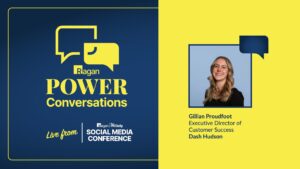The top comms takeaways from Davos 2023
This year’s event offered several takeaways about the economy and the state of work that can guide your comms strategies in the coming year.

Held each year in Davos, Switzerland, The World Economic Forum’s annual event sees economic experts and business leaders alike gather to discuss the state of the global economy in the coming year. The theme of this year’s event, “Cooperation in a fragmented world,” signifies not just the challenges that lay ahead for our global economy, but for the business and workforces that make the economy run.
To that end, this year’s event offered several takeaways about the economy and the state of work that can guide your comms strategies in the coming year. Here are a few that stuck out.
1. Remember that your customers and employees alike are feeling economic uncertainty.
By several accounts, the mood was dour in Davos as leaders express frustration at the looming uncertainty of economic stability.
PayPal CEO Dan Schulman, ever the outspoken leader, went further on a panel Tuesday that our global financial system is failing the average person. He noted that the current system fails at least four billion people—two billion of whom are living outside of it, and another two billion who are forced to pay high fees and interest rates that the wealthy are not subject to.
“We have a good financial system…but I don’t think it’s doing the job that it needs to do, which is being an inclusive economy that brings everybody in together,” Schulman said according to The Wall Street Journal.
Schulman’s comments give an added sting to continued concerns over ongoing concerns about a potential U.S. recession. While several executives said they have been preparing for a recession for months, former Treasury Secretary Larry Summers told WSJ he is less pessimistic:
Davos attendees “are sort of daring to be hopeful but not entirely convinced of being hopeful,” Mr. Summers said. He has predicted that to bring inflation down, a recession would be necessary. He still doesn’t expect a soft landing, when growth slows but doesn’t turn negative. “But it looks more plausible to me that there would be a soft landing than it did, principally because the economy is staying strong.”
Banco Santander SA Executive Chair Ana Botín shared Summers’ outlook, claiming that high employment levels and net household wealth will help the global economy avoid the sort of recession last felt in 2008 and 2009. “There is a probability of recession, but without loss of jobs, it’s not going to be the same kind of recession,” she said.
Matt Prince, CEO of Cloudflar Inc., said that recent client conversations indicate a pattern: Business is slowing, companies are cutting costs and slowing hiring to prepare for an inevitable downturn. “Anyone who’s not nervous isn’t paying attention,” he said. “Customers are saying: These are tough times.”
Prince’s perspective offers a reminder that your clients, customers and employees alike are feeling the uncertainty now. How can your corporate communications strategy adjust to address this and provide resources that minimize the uncertainty? Such resources could take the form of added financial planning benefits and training for employees and new payment policies or options for clients and customers.
Your leaders can score points by being honest and upfront about what the most recent economic projections mean for your business by speaking to them — outside of earnings calls — in executive comms and thought leadership pieces, town halls and more.
2. Encourage leaders to address how your organization trains new talent with a focus on equity.
Attending Davos for the first time, U.S. Secretary of Labor Marty Walsh acknowledged that an economic slowdown will appear in certain sectors of the economy, but not the entire thing. “When people talk about these tech layoffs that are happening, they say, ‘Oh my God, all these tech workers out of work.’ But those workers are finding new jobs right away,” he told Axios.
During a panel on the future of jobs, Walsh also acknowledged that the workplace is going to continue to look very different and not go back to what it was pre-pandemic. He recounted his time as mayor of Boston for seven years, building workforce development programs with colleges and universities for people who may not have college degrees and understanding that equity is front and center in the new workplace.
“We have lots of folks in America working mediocre jobs,” said Walsh, “meaning they’re paid mediocre, they feel (the) mediocre pay, they’re not quite middle class, they want to be middle class.”
“So, the future is this… we’re doubling down on apprenticeships, we’re doubling down on workforce development job training, we need to make sure the systems that are in place (for) actually going out and recruiting people into new industries.”
Walsh added that inequality manifests in many forms when it comes to getting folks back to work — from the disproportionate hiring rates of Black talent to a lack of childcare benefits making it hard for women to return to work.
He then emphasized how leadership is needed now more than ever as a means to address this inequality at work. “It’s time for action, it’s not time for talking. We know the problems, we know the challenges, we have a lot of ideas and solutions. Let’s implement those solutions and let’s stop talking about them.”
3. Help employees work with AI, not fear it.
Microsoft, an early investor in the OpenAI research lab behind the popular ChatGPT chatbot, said the company would move quickly to commercialize ChatGPT and similar tools like image generator Dall-E 2.
Speaking on a Tuesday panel, Microsoft CEO Satya Nadella shared the company’s plans to incorporate ChatGPT into all of its products as platforms that other businesses can build on.
Nadella said Microsoft plans to give users access to these tools through its cloud-computing platform in an effort to make Azure a destination for the development of AI capabilities.
“Every product of Microsoft will have some of the same AI capabilities to completely transform the product,” Nadella said according to WSJ.
He also acknowledged concerns over AI’s rapid advances and stressed that workers should embrace the tech, rather than fear it will replace them He referenced how software developers can use AI to generate some of the code they write as an example of how the tech can help streamline a process to complement a human’s talents — not replace them.
This full story is available exclusively to members of the Communications Leadership Council. For more information on becoming a member, click here.
Justin Joffe is the editor-in-chief of Ragan Communications. Outside of Ragan he is also a media and culture writer, an avid music nerd, cinephile, and musician whose recorded output ranges from ambient and experimental to folk and rock’n’roll. Follow him on Twitter and LinkedIn.







